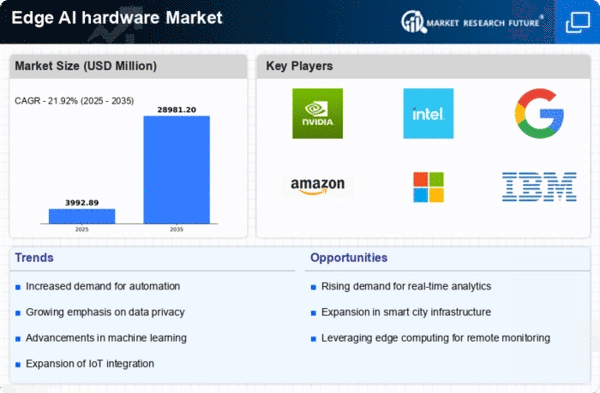Top Industry Leaders in the Edge AI hardware Market

The Competitive Landscape of the Edge AI Hardware Market
Edge AI, the processing of data on devices at the edge of the network, is reshaping industries from manufacturing to healthcare. This burgeoning market is fueled by powerful hardware solutions that analyze data in real-time, enabling faster decision-making and improved efficiency. Understanding the competitive landscape is crucial for navigating this dynamic terrain and seizing opportunities.
Key Player:
- Intel Corporation
- Samsung Electronics Co., Ltd.
- Google Inc.
- NVIDIA Corporation
- Qualcomm
- Media Tek Inc.
- Xilinx Inc.
- Microsoft Corporation
- Huawei Technologies Co., Ltd.
- Imagination Technologies Limited
- Cambricon Technologies
Strategies Adopted by Leaders:
- Product Diversification: Established players like NVIDIA and Intel are expanding beyond traditional high-performance GPUs, offering specialized edge AI accelerators like NVIDIA's Jetson platform and Intel's Neural Compute Stick. This caters to diverse application needs and performance requirements.
- Open-Source Platforms and Tools: Fostering open-source ecosystems like Google's TensorFlow Lite and Edge TPU enables faster development and wider adoption of edge AI solutions. This democratizes access to technology and fosters collaboration.
- Partnership and Collaboration: Strategic collaborations accelerate market reach and expertise. NXP Semiconductors' partnership with Alibaba Cloud expands its reach in the Chinese market, while Qualcomm's collaboration with Microsoft Azure provides developers with integrated edge AI solutions.
- Focus on Low Power and Efficiency: Edge devices often operate on limited power budgets. Companies like Arm are prioritizing low-power processors specifically designed for edge AI applications, while Samsung is developing energy-efficient memory solutions.
- Security and Privacy Integration: Concerns around data security and privacy are paramount. Companies like Microchip Technology are embedding hardware-based security features in their edge AI chips, while STMicroelectronics offers solutions compliant with strict data privacy regulations.
Factors for Market Share Analysis:
- Brand Reputation and Installed Base: Established players like Texas Instruments and Xilinx hold an advantage with proven track records and extensive deployments in various industries. Their established reputation attracts loyal customers and repeat business.
- Technology Breadth and Depth: Offering a diverse range of hardware options like GPUs, CPUs, and specialized AI accelerators, like Synopsys' DesignWare ARC processors, caters to different performance and cost needs. This breadth attracts a wider client base.
- Compliance and Regulatory Certifications: Meeting industry standards and safety regulations is crucial for certain applications. Infineon Technologies' compliance with automotive safety standards expands their reach in the connected car market, while Renesas Electronics' adherence to medical device regulations opens up healthcare opportunities.
- Software Development Kits and Support: Comprehensive support and development tools are invaluable for integrating edge AI hardware into complex systems. NVIDIA's JetPack SDK and Intel's OpenVINO toolkit simplify development and accelerate time-to-market.
- Focus on Vertical Integration: Companies like Amazon Web Services (AWS) and Microsoft Azure are integrating edge AI hardware with their cloud platforms, offering end-to-end solutions for data collection, processing, and analysis. This vertical integration provides a seamless user experience.
New and Emerging Companies:
- Graphcore: Pioneering specialized AI processors with high performance and low power consumption, targeting demanding applications like autonomous vehicles and robotics.
- Edge Impulse: Offering a cloud-based platform for developing and deploying edge AI models, simplifying the process for developers without hardware expertise.
- Myriad: Specializing in vision processors specifically designed for edge AI applications in the smart home and security sectors.
- Tencent AI: Focusing on developing edge AI solutions for the Chinese market, leveraging its vast user base and expertise in cloud computing and AI.
Latest Company Updates:
Intel Corporation:
- October 20, 2023: Intel unveils the 4th Gen Intel Xeon Scalable processors with built-in Intel Deep Learning Boost (DL Boost) technology, optimized for edge AI workloads. This new generation offers significant performance improvement for tasks like image recognition and natural language processing at the edge
- August 3, 2023: Intel partners with Dell Technologies to launch the Dell Latitude 7330 Rugged Extreme Tablet, powered by the Intel Atom x64e processor. This rugged device is designed for edge AI applications in harsh environments like manufacturing and field services
Samsung Electronics Co., Ltd.:
- October 17, 2023: Samsung releases the Exynos 2200 Mobile Processor with an integrated neural processing unit (NPU) specifically designed for edge AI tasks on smartphones and other mobile devices. This NPU boasts improved performance and lower power consumption for on-device AI processing
- July 25, 2023: Samsung unveils the SmartSSD AI V-NAND NVMe SSD, optimized for edge AI applications. This SSD offers high-speed data processing and low latency, critical for real-time edge AI computations









